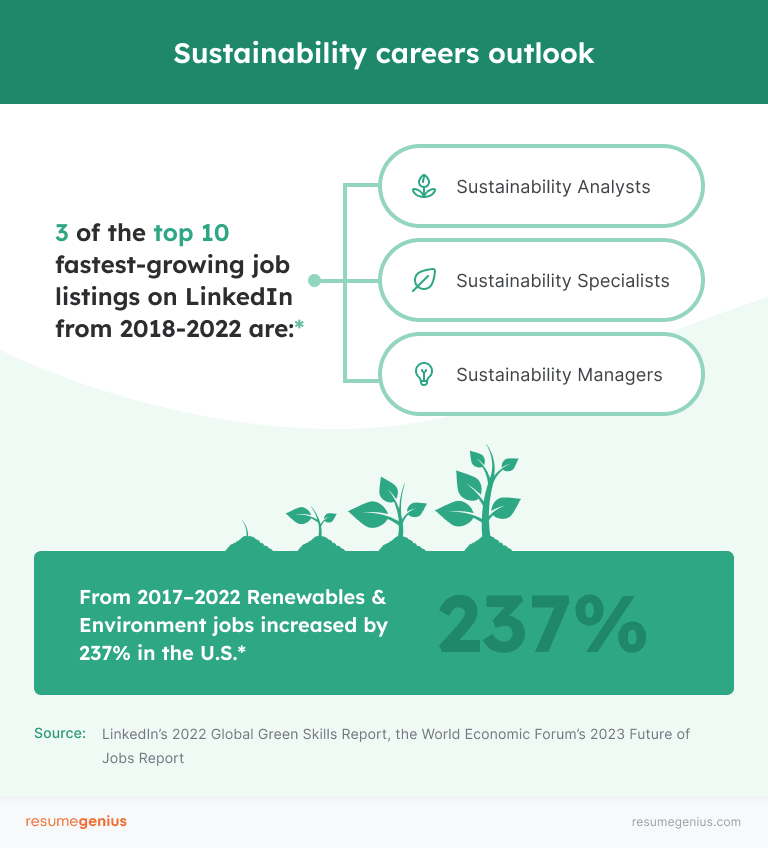NOTE: This page is regularly updated to include new data and best reflect current hiring trends. We outline our methodology and provide a bit of context about who we are at the end of the report.
Green jobs are roles that contribute to the economic shift toward environmental sustainability, and can be found across industries. And while the green job market is growing, the talent pool isn’t keeping pace.
For many climate-concerned job seekers, compensation is one of the most important factors when considering whether to leave a current position for a green job.
Although the general perception of green jobs is that they don’t pay well, this isn’t necessarily true. Here are 10 of the highest-paying green jobs in 2024:
| Job | Median Annual Salary | # of Jobs | Estimated Job Growth |
|---|---|---|---|
| Natural sciences manager | $157,740 | 86,300 | 5% |
| Marketing manager | $157,620 | 389,800 | 6% |
| Software developer | $132,270 | 1,795,300 | 25% |
| Aerospace engineer | $130,720 | 63,800 | 6% |
| Electronics engineer | $119,200 | 299,700 | 5% |
| Environmental economist | $115,730 | 17,600 | 6% |
| Chemical engineer | $112,100 | 20,800 | 8% |
| Electrical engineer | $106,950 | 299,700 | 5% |
| Materials scientist | $106,160 | 95,000 | 6% |
| Construction manager | $104,900 | 505,800 | 5% |
1. Natural sciences manager
- Median annual salary (2023): $157,740
- Number of jobs (2022): 86,300
- Estimated job growth (2022–2032): 5%
- Degree needed: Bachelor’s degree
Job responsibilities for natural sciences managers
Natural sciences managers lead and coordinate scientific research and development efforts, focusing on advancing green practices in fields such as environmental health, water resource management, and conservation.
In this role, you’d be managing different teams, setting project goals, and ensuring all projects comply with environmental regulations and contribute to your company’s sustainability goals.
2. Marketing manager
- Median annual salary (2023): $157,620
- Number of jobs (2022): 389,800
- Estimated job growth (2022–2032): 6%
- Degree needed: Bachelor’s degree or relevant experience
Job responsibilities for marketing managers
Marketing managers in the green industry develop and lead campaigns to promote eco-friendly products.
You’ll get to work on a variety of tasks such as analyzing trends, crafting messages for various media, organizing events, and collaborating with like-minded organizations to enhance brand awareness and encourage sustainable consumer choices.
3. Software developer
- Median annual salary (2023): $132,270
- Number of jobs (2022): 1,795,300
- Estimated job growth (2022–2032): 25%
- Degree needed: Bachelor’s degree or relevant experience
Job responsibilities for software developers
If you’re passionate about sustainability and technology, a role as a software developer could be ideal for you. Software developers in green companies work hard to create and implement software solutions that enhance environmental sustainability.
For example, your projects might include developing applications that optimize energy consumption in buildings, creating systems to monitor environmental conditions, or designing tools that manage renewable energy resources.
4. Aerospace engineer
- Median annual salary (2023): $130,720
- Number of jobs (2022): 63,800
- Estimated job growth (2022–2032): 6%
- Degree needed: Bachelor’s degree
Job responsibilities for aerospace engineers
Aerospace engineers design, develop, and test aircraft, spacecraft, satellites, and missiles.
As an aerospace engineer focused on sustainability, your team would use innovative materials like biofuels to make aircraft and propulsion systems more eco-friendly and fuel-efficient.
5. Electronics engineer
- Median annual salary (2023): $119,200
- Number of jobs (2022): 299,700
- Estimated job growth (2022–2032): 5%
- Degree needed: Bachelor’s degree
Job responsibilities for electronics engineers
As an electronics engineer dedicated to sustainability, your job would involve designing and improving systems to make technology more energy-efficient, especially in renewable energy sectors.
In sustainable electronics engineering, you consider the entire life cycle of products, from the materials used to build them to how they are disposed of or recycled. Your goal is to develop solutions that meet our needs today without harming the environment or limiting future generations’ options — all while considering their impact on society and the economy.
6. Environmental economist
- Median annual salary (2023): $115,730
- Number of jobs (2022): 17,600
- Estimated job growth (2022–2032): 6%
- Degree needed: Master’s degree or Ph.D
Job responsibilities for environmental economists
Environmental economists evaluate how government policy impacts both the economy and the environment, focusing particularly on managing finite resources like water, air, and land.
In this role, you’ll help governments understand the pros and cons of different environmental strategies and guide them in creating policies that encourage green practices, such as eco-agriculture. Your work will be vital for ensuring that our economic actions protect natural resources and keep ecosystems healthy over time.
7. Chemical engineer
- Median annual salary (2023): $112,100
- Number of jobs (2022): 20,800
- Estimated job growth (2022–2032): 8%
- Degree needed: Bachelor’s degree
Job responsibilities for chemical engineers
Chemical engineers specializing in energy and sustainability optimize how we convert raw materials into useful products.
You’ll get to combine your knowledge of the molecular makeup of materials with the bigger picture of system design and work on innovating processes that make industrial operations more sustainable, cost-effective, and environmentally friendly. This role is perfect if you’re passionate about applying scientific knowledge to directly tackle some of today’s most pressing environmental challenges.
8. Electrical engineer
- Median annual salary (2023): $106,950
- Number of jobs (2022): 299,700
- Estimated job growth (2022–2032): 5%
- Degree needed: Bachelor’s degree
Job responsibilities for electrical engineers
Electrical engineers design electrical systems and infrastructure to enhance energy efficiency and support renewable energy sources like solar power. Their work ensures that electrical systems are both sustainable and capable of meeting modern energy demands.
On the job, you’ll likely work on a variety of projects, from setting up solar power systems to developing smart grids that optimize electricity usage.
9. Materials scientist
- Median annual salary (2023): $106,160
- Number of jobs (2022): 95,000
- Estimated job growth (2022–2032): 6%
- Degree needed: Bachelor’s degree
Job responsibilities for materials scientists
Material scientists in sustainability develop new materials that are better for the environment, such as biodegradable plastics, lightweight metals, and building materials that help conserve energy in homes and businesses.
This type of work involves collaborating with engineers and environmental scientists to ensure that new materials can be effectively integrated into current manufacturing processes and contribute to sustainability goals.
10. Construction manager
- Median annual salary (2023): $104,900
- Number of jobs (2022): 505,800
- Estimated job growth (2022–2032): 5%
- Degree needed: Bachelor’s degree
Job responsibilities for construction managers
Construction managers in sustainability lead building projects that focus on environmental responsibility and resource efficiency. They work closely with architects, engineers, and builders to ensure every aspect of the project meets green standards.
In this role, you might also upgrade older buildings to improve their energy efficiency and reduce environmental impact, or devise strategies for constructing new eco-friendly structures.
The outlook for green jobs
With green job growth on the rise, the outlook for future job opportunities is overwhelmingly good.
In the World Economic Forum’s 2023 Future of Jobs Report, they predict that rising trends toward sustainability (such as consumer demand, greater application of ESG standards, green transition investment, and climate change adaptation investment) will drive significant job growth.
While it’s difficult to measure the precise growth of green jobs (as definitions vary), all evidence suggests that we’re seeing a societal shift toward a greater focus on sustainability, with a growing demand for talent to support it.
So if you want to pursue work in sustainability, there’ll be increasing opportunities for career growth.
Create your own green career path
You don’t have to be a scientist or install solar panels to have a green career.
Green entrepreneurship is growing fast and taking place outside of traditionally “green” industries, so if you have an idea for a green business, now could be a great time to get started.
Additionally, according to LinkedIn’s 2023 Global Green Skills Report, green skills are becoming more integral to professions across sectors. LinkedIn’s report refers to roles outside of traditional “green jobs” as “greening” or “greening potential” jobs that require some level of green skill.
For example, these roles could include energy efficiency in utilities roles, sustainable design in architecture, or carbon accounting in supply chain management.
Natalie Lavery, Climate People‘s Head of Marketing, sees the green industry impacting all parts of the economy and offering diverse job opportunities.
Climate isn’t limited to a niche industry; it permeates every facet of the global economy. Instead of viewing climate-related jobs as a mere subset, consider them as a fundamental repositioning of the entire economic landscape. Companies focused on climate span various sectors like transportation, food, and construction, where every role contributes to lessening the effects of climate change. This perspective illuminates the array of opportunities across industries, levels, and fields. Climate-related roles encompass marketing, sales, engineering, and other disciplines.
If you work in a role with the potential to incorporate green skills, developing and implementing those skills is a powerful way to support the transition to a green economy and build a sustainable future.
Finally, no matter what company you work at, you can also consider creating a sustainablity group to advocate for sustainable policy and company action.
How to land a green job
According to Work on Climate’s survey research, some of the top barriers preventing people from pursuing climate jobs are:
- not knowing how their skills translate to a climate role
- thinking they aren’t knowledgeable enough about climate solutions to get a job
- believing it will be difficult to find a climate job they want
Let’s go over how you can develop relevant skills and experience, showcase your knowledge, and land a fulfilling green job.
1. Pursue education
Green jobs are often highly specialized and require specific credentials, education, training, and technical skills, so getting a degree in your chosen field will be a big asset in your job search later on.
If you’re not pursuing a traditionally “green” job requiring a specific degree, try to find a program in your area of interest that offers a concentration in sustainability.
Here are some degrees in sustainability that can help you carve out your career path.
| Bachelor’s degree in sustainability | Master’s degree in sustainability |
|---|---|
| Bachelor in Social Justice and Sustainability | Master’s in Business Administration (Concentration in Sustainability) |
| BA Environmental Studies | MELP/LLM in International Environmental Law & Policy |
| BA/BS in Sustainable Urban Development | MS in Architecture (Concentration in Energy Performance) |
| BS in Business Administration (Concentration in Sustainability) | MS in Climate Science and Policy |
| BS in Conservation Biology | MS in Climate Science & Solutions |
| BS Environmental Engineering | MS in Global Energy Management |
| BS Environmental Science | MS/MEM in Environmental Management |
| BS in Marine Resource Management | MSc in Agroecology |
| BS in Native Environmental Science | MSc in Natural Resources Science and Management |
| BS in Sustainable Agriculture and Food Systems | MSc in Sustainable Agriculture & Food Systems |
| BS in Sustainable Science Management | MSc in Sustainable Business |
| BSc/BA in Sustainability Studies | MSc in Sustainable Fashion |
| BSc in Energy and Sustainability Policy | MSc Sustainable Urban Planning |
| BSc in Natural Resource Science and Management | MSc in Water Resources Management |
| BS in Sustainable Development |
2. Get a certification
Higher education isn’t the only path to a green career. There’s a large (and growing) number of certifications for professionals who want to work in climate and sustainability.
If you’ve already earned a college degree or are making a mid-career transition, certifications can be a great way to enhance your qualifications and demonstrate your expertise to employers.
Keep in mind that some certifications, particularly those geared toward professionals in more technical fields, will require some level of education and/or professional experience to complete the certification.
- Certified Environmental Professional (CEP), Academy of Board Certified Environmental Professionals (ABCEP) (you can also get a Certified Environmental Professional In Training Certification (CEP-IT) if you don’t have professional experience yet)
- Certified Climate Change Professional (CC-P), Association of Climate Change Officers (ACCO)
- Sustainability Excellence Associate (SEA), International Society of Sustainability Professionals (ISSP) (the next level up is the Sustainability Excellence Professional (SEP) Certification)
- Circular Economy Specialist Certification (other levels also available), Circular Economy Institute
- LEED Green Associate, U.S. Green Building Council (USGBC)
- Certified Energy Manager (CEM), Association of Energy Engineers (AEE)
- Environmental Sustainability Professional (ENV SP), Institute for Sustainable Infrastructure (ISI)
- Certified Sustainable Development Professional (CDSP), Association of Energy Engineers (AEE)
- Living Future Accreditation (LFA), International Living Future Institute
- Certified Sustainable Supply Chain Professional (CSCP), Association for Supply Chain Management (ASCM)
- Green Globe Certification, Green Globe International
- ESG Certificate, Competent Boards
- Sustainability and Climate Risk (SCR) Certificate, Global Association of Risk Professionals
Lavery advocates for approaching a transition to the climate sector as you would any career shift. She says:
Just as a healthcare startup doesn’t require a healthcare degree for marketing roles, working in a climate company doesn’t mandate a specialized ‘green’ background. Showcasing a passion for climate can compensate for lack of experience in the eyes of employers. Numerous exceptional climate cohorts like Terra, Climatebase, Voiz Academy, and One Point Five can help job seekers get a lay of the land.
Natalie Lavery, Head of Marketing at Climate People
There are other ways to get the experience and qualifications you need for a green career as well. Some options include vocational training, volunteering, trade school, and apprenticeships.
3. Develop your skill set
According to LinkedIn’s 2023 Global Green Skills Report, job postings requiring green skills grew 22% from 2022–2023, while the pool of qualified candidates grew at about half that rate, at 12%. These rates are a big jump compared to the previous five years (2018–2023), when green job listings grew by 9% and the number of skilled workers grew by 5% each year.
The difference between jobs requiring green skills and candidates that possess those skills means that there’s a large skills gap that’s slowing the shift toward a sustainable economy.
Having a robust set of green skills will make you a competitive candidate. You should develop both the soft skills and hard skills needed for a green (or greening) role.
Hard skills are abilities gained through hands-on experience or training, like proficiency in specific software or programming languages. For a sustainability career, hard skills could include solar panel installation or sustainable product design.
Here’s a list of green skills that’ll help make you a top choice for employers:
- Renewable energy systems: solar, wind, hydro, and bioenergy technologies.
- GIS and remote sensing: using geographic information systems for environmental mapping and analysis.
- Environmental engineering: designing solutions for environmental challenges like waste and pollution.
- Advanced material science: developing sustainable materials that reduce environmental impact.
- Battery technology and storage: skills in energy storage solutions vital for renewable integration.
- Electric vehicle systems: understanding the technology and infrastructure behind electric vehicles.
- Artificial intelligence for environmental management: using AI to enhance environmental monitoring and resource management.
- Carbon management: includes carbon footprint analysis, carbon accounting, and managing carbon credits.
- Environmental assessment & analysis: skills in environmental auditing, impact assessment, and data analysis.
- Data analysis: analyzing large datasets to support environmental decision-making and strategies.
- Program management: overseeing a portfolio of projects and initiatives focused on environmental outcomes.
- Strategic planning: developing long-term strategies to achieve sustainability and environmental stewardship.
- Sustainable supply chain management: ensuring resource efficiency and minimal environmental impact across supply chains.
- Environmental law & regulations: understanding and ensuring adherence to environmental regulations and policies.
- Sustainability reporting and compliance: including ESG reporting and other sustainability assessments.
- Sustainable design: designing products and infrastructures that are environmentally sustainable.
- Biomimicry design: innovating by emulating nature’s time-tested patterns and strategies.
- Cleantech innovation: developing and applying clean technologies to enhance sustainability.
- Community outreach: engaging with communities to promote environmental awareness and action.
- Corporate Social Responsibility (CSR): integrating social and environmental concerns in business operations.
- Corporate sustainability: implementing practices that lead to sustainable business operations.
Highlighting your transferable soft skills is also a great way to demonstrate your value as a candidate.
According to a recent study conducted by the Resume Genius research department, 48% of employers believe soft skills are a must-have in a candidate, while 28% believe that they’re even more important than a candidate’s hard skills.
Sebastian Morgan, Career Expert at CV Genius says,
“Sustainability is a rapidly growing field and employers are always on the lookout for top talent. But don’t feel discouraged from applying for jobs that don’t fit your skills and experience. Focus on highlighting your transferable skills and the work you’ve done that demonstrates you’re capable of handling the duties of the role.”
Here are some transferable skills to highlight for a green job:
- Analytical thinking
- Communication
- Interdisciplinary collaboration
- Creativity
- Curiosity
- Environmental stewardship
- Flexibility
- Leadership
- Motivation
- Problem solving
- Resilience
4. Network with professionals in the sustainability industry
One of the best ways to build a successful sustainability career is to network with like-minded professionals. Networking will provide you with opportunities for learning and growth as well as help you make valuable connections that can land you a job.
Joining professional associations, attending workshops and conferences, and even finding local green businesses where you can meet the owner or employees are all great places to start.
There are also several online communities of professionals supporting the transition to a green economy. Here’s a short list of green communities and networks you can get involved in:
- BSR
- ClimateAction.tech
- Green Latinos
- MCJ Collective
- Net Impact
- New Energy Nexus
- Tofu
- Women and Climate
- Work on Climate
Conrad Benz, Hiring Manager at Resume Genius, encourages job seekers to stay up-to-date on trending green topics. He says,
“Staying active in online discussions and keeping up with the latest articles will position you as an informed voice in the green jobs sector. By consistently engaging with and contributing to conversations on sustainability, you’ll enhance your visibility and also establish yourself as someone who cares deeply about the environment.”
5. Use social media
Social media is a popular recruitment tool, and a great place to learn about potential employers, find professional opportunities, and make helpful connections.
LinkedIn, Facebook, Instagram, and Twitter are particularly useful platforms for job hunting. Choose one or two to focus your efforts around, then use these tips:
- Tailor your profile (using relevant keywords) to target the job you want and increase your chances of being seen by recruiters.
- Follow companies you’re interested in to get a better idea of the company culture, values, and day-to-day operations.
- Follow hashtags that will bring more job opportunities to your feed, for example: #greenjobs
- Connect with employees at your target companies and reach out with questions or let them know about your interest. Employee referrals have a high applicant-to-conversion rate.
- Engage and interact with content in the career space you’re aiming for to show recruiters you’re motivated.
Daniel Hill, Innovation Director at Environmental Defense Fund, has created the #OpenDoorClimate movement on LinkedIn, inviting climate professionals to implement an open door policy. It’s proven to be an invaluable source for job seekers looking to connect with and learn from professionals in their target career.
Where to find green jobs
Here’s a list of dedicated niche job boards:
- Alt Protein Careers
- Climate Draft
- Climate Jobs List
- Climatechangejobs.com
- Climatebase
- Climate People
- ClimateTechList
- Conservation Job Board
- CTVC
- Earthworks-jobs.com
- EcoJobs.com
- Ecological Society of America Career Center
- Environmental Jobs
- EnvironmentalCareer.com
- Greenbiz Sustainability Jobs
- Green Jobs Board
- Greenjobsearch.org
- Idealist
- JobsForSustainability.com
- Josh’s Water Jobs
- MCJ Collective Jobs
- Naturetech.io
- North American Association for Environmental Education Job Board
- Reconsidered
- Responsible Tech Job Board
- Schmidt Marine Ocean Job Board
- Sustainablebusiness.com
- Terra.do Job Board
- Veganjobs.com
- Work For Impact (independent contracting platform)
- Work on Climate (slack community)
- Work in Green
Another great place to look for green jobs is on USAJOBS.gov. Check for open positions in the Department of Energy or the Environmental Protection Agency, or see if your local government has green job openings.
Additional resources
For more information on green jobs and how to pursue a green career, check out these helpful resources:
- Climate Solutions At Work, from Project Drawdown
- CTVC Starter Pack
- Work on Climate Starter Packs
- 2023 Climate Job Seeker Playbook, from Climate People
- 80,000 Hours
Frequently asked questions about green careers
Below we offer answers to some frequently asked questions about green jobs.
How do you break into a green career?
You can break into a green career by honing your skills and qualifications, finding opportunities for experience, and making the right connections.
- Consider getting a relevant certification or taking courses to develop your green skills.
- Gaining some experience through volunteer work is a great way to showcase your professional abilities and strengthen your resume.
- Use tools like social media and online communities to connect with professionals in your target field or role.
If you’re looking to make a career pivot, consider what options are available in your current field or industry. Chances are good you could make a lateral career move into a sustainable management role rather than switching industries entirely.
Are green jobs a good career path?
Green jobs are a good career path if you’re seeking a fulfilling, values-driven profession and believe in the importance of building a sustainable future.
Depending on what role you go for, you can make a good living with a green career. The green job market is growing, so there will be an increasing need for skilled talent.
What are “green” jobs?
“Green jobs” are jobs that further environmentally sustainable practices, production, infrastructure, and policy. There are many industries where you can find green jobs. Here are some key sectors where sustainability jobs are common:
- Agriculture
- Business
- Climate tech
- Conservation
- Energy & infrastructure
- Fashion
- Government & NGOs
- Law & policy
- Science & research
What degree do you need for a green career?
What degree you need for a green career depends on your chosen field or industry. For example, if you’re applying for work as a solar engineer, an environmental engineering degree would be best.
If you want to become a sustainability consultant or specialist, you should look for a degree in sustainability studies or sustainable business.
Whatever your desired career, choose the most relevant and fitting degree program to help you reach your professional goals.
Methodology
The Resume Genius research team sourced its data from O*NET, specifically targeting O*NET’s Green Occupations to ensure comprehensive coverage of all industries. This analysis included matching job titles to categories such as “Green New and Emerging,” “Green Enhanced Skills,” and “Green Increased Demand.”
The analysis was further refined by cross-referencing findings with the U.S. Bureau of Labor Statistics’ (BLS) Occupational Outlook Handbook. This step ensured that the selected occupations adhered to environmental criteria, as well as a minimum annual median salary of $59,540 and faster-than-average growth projections. These standards are based on the national median salary for salaried U.S. workers at the end of 2023, as reported in the Weekly Earnings of Wage and Salary Workers, assuming full-time employment for 52 weeks per year.
Sources
- ESG Today, “Over 40% of Gen Z, Millennials Would Switch Jobs Over Climate Concerns: Deloitte Survey”
- Fast Company, “Meet the Seattle Punk Tocker who Wants Your Boss to Take Action on the Climate”
- Forbes, “COP28 Focus: Huge Green Skills Shortage Says LinkedIn Study”
- Gitnux, “Must-Know Employee Referral Statistics [Current Data]”
- GreenBiz, “Overcoming the top Climate Jobseeker Barriers”
- Lightcast, “The Growth of Green Jobs”
- LinkedIn, “Energy Workforce Trends and Outlook”
- LinkedIn, “Global Green Skills Report 2022”
- LinkedIn, “Global Green Skills Report 2023”
- O*NET OnLine, “Green Occupations”
- U.S. Bureau of Labor Statistics, “Good Wages for Green Work: High-Paying Careers With an Environmental Focus”
- U.S. Bureau of Labor Statistics, “Occupational Outlook Handbook”
- Work on Climate, “How to Attract People Into Working on Climate”
- World Economic Forum, “Future of Jobs Report 2023”
About Resume Genius
Since 2009, Resume Genius has combined innovative technology with leading industry expertise to simplify the job hunt for people of all backgrounds and levels of experience.
Resume Genius’s easy-to-use resume builder and wide range of free career resources, including resume templates, cover letter samples, and resume writing guides, help job seekers find fulfilling work and reach their career goals. Resume Genius is led by a team of dedicated career advisors and HR experts and has been featured in The New York Times, Forbes, CNBC, and Business Insider.
For media inquiries, please contact us.
















